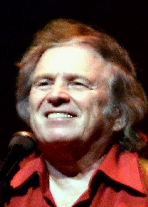
Don McLean’s epic song “American Pie” laments “the day the music died” – the 1959 plane crash which killed Buddy Holly, Ritchie Valens, and The Big Bopper – and also tells a beautifully cryptic story about the subsequent evolution of rock ‘n’ roll and society. An enduring classic, it spent four weeks at Number One in 1972, and in 2017 was selected for preservation in the National Recording Registry by the Library of Congress.
But McLean wasn’t a one-hit wonder. The American Pie album also included the hit song “Vincent”, a meditation on Vincent van Gogh and his masterpiece painting “Starry Night”. Other notable Don McLean songs include “Dreidel”, “Wonderful Baby”, “Since I Don’t Have You”, “Castles in the Air”, and a hit cover of Roy Orbison’s “Crying”. His most recent album was last year’s Botanical Gardens.
This interview was for a preview article for noozhawk.com for the 8/16/19 Don McLean concert at the Libbey Bowl in Ojai, California. It was done by phone on 7/10/19. (Publicity photo)
Jeff Moehlis: Your songs have a lot of stylistic variation, both musically and lyrically. Is that something you consciously strive for?
Don McLean: Yes, I want to challenge myself. A “Wonderful Baby”, for example, has got to have a different kind of music and a different kind of lyric than a “Headroom” or an “American Pie”, or something like that. They’re little films, really. They’re visual. They’re a little world that I try to create, so everything has to be different. It has to be tailored in a whole different way.
JM: Is that difficult to do?
DM:: Well, that’s the fun of it. I would be bored to death writing the same style of song over and over. You know, I surely would love to have a lot more hit records, but if that’s what I had to do, it wouldn’t be something that would go well with my goals as an artist. For example, I could’ve just written every now and then another “American Pie”-type song, with “American” in the title and all that, and a lot of people do that sort of thing. But that’s not my way. I’m a purist, in a sense. I try to do the absolute most perfect thing that I can do, and then I move on to the next thing.
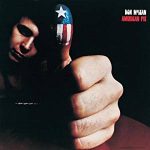
JM: I’m not going to ask about the meaning of “American Pie”, because you’ve been asked that a thousand times. But, what’s the strangest theory or interpretation that you’ve heard for that song?
DM:: I’ve had cults write dissertations about godlessness in America, and how it related back to them in some way. I’ve been around for 50 years, and I’ve seen a lot of things in a lot of countries. But it’s fascinating to me how handy the song is. Recently there’s a YouTube parody of the song called “The Day Collusion Died”, and it’s great. The guy who wrote it really put a lot of time into it, and sings it with a track that sounds just like the record. I mean, I couldn’t do that if my life depended on it, so it’s pretty interesting how it inspires some people to do something like that.
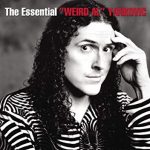
JM: I’m sure you’ve heard Weird Al Yankovic’s re-write, “The Saga Begins”. What do you think of that?
DM:: I like Weird Al. He’s a friend of mine, and I like what he did with that.
JM: One other “American Pie” question. I read that you had to fight to get that to be recorded the way that you heard it in your head. Could you explain a bit about that?
DM:: Everything is sort of in my head, the song, which I say kind of comes in on my radio waves… I’ll go for years and I won’t write anything. You wouldn’t even think I was a songwriter. And then all of a sudden I’ll start to have an accumulation of notions, and a way to go, a direction of some sort, and then I’ll start writing some tunes, and one thing will lead to another. Once I have that, I have an idea of how I want the thing to sound.
I knew how “American Pie” had to sound. You know, it takes an empathetic producer and musicians to care about that. Most studio musicians and many producers are not empathetic. They have their idea of how things ought to be, and you’re just another client who’s coming through town. But [producer] Ed Freeman was very empathetic to my music and what I was after, and the musicians eventually figured out what the groove was in the song. So that allowed everything to be built around it.
Everything in a recording situation is a lot like carpentry. You know, if your house isn’t plumb, if it sags to one side of the other, you can do a lot of fixing up, but you’re not ever going to make it plumb. And if your angles aren’t right, and if everything is incorrect, it’s never going to be that way. You’re always going to be fiddling around and trying to fix it. That has to do also with the way things are recorded. If there’s a poor EQ on a bass, or if there’s bleed from the drums and it colors the other instruments, you’re not going to be able to fix that. So you have to have people who know what they’re doing all the way up and down the line in order to make a really good record.
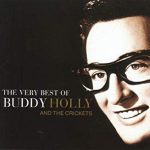
JM: Have you ever visited the Surf Ballroom in Clear Lake, Iowa [where Buddy Holly, Ritchie Valens, and The Big Bopper last performed], and the crash site?
DM:: Yeah. Well, I don’t go to the crash site – I think that’s a little bit maudlin. But I have played, I think it was Buddy’s 50th birthday, back in 1980-something. That was quite an experience. A lot of people were there. Peggy Sue was there, and Donna was there from the song “Donna”, and different relatives. Niki Sullivan was there, who was one of the Crickets who dropped out. As a kid, I always wondered what happened to Niki. He ended up working for Sony. He just left the music business altogether. But he was very sweet – now he’s passed away. You know, a lot of folks were there – relatives and family. The Picks were there – they were a family of singers. Elvis would use the Jordanaires, but down in, I guess, Texas and New Mexico the Picks were the local background voices people used.
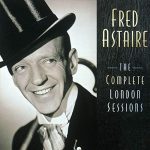
JM: Do you have a favorite cover version of one of your songs?
DM:: I have two favorites. One is the Elvis Presley version of “And I Love You So”, and the other is the Fred Astaire version of “Wonderful Baby”. That’s a nice one.
JM: I understand that back in the day, you opened for bands like Steppenwolf. How did that go?
DM:: I was struggling, of course. I had gotten a degree from college, and taking three and a half years to do that. So I was a little bit older – I was probably about 24 years old around then. I got signed to William Morris [Agency], which was a very, very good thing. William Morris went about exploiting me and building me, and by doing that they wanted to put me in front of every kind of audience, so I was on the road with Steppenwolf, Three Dog Night, Ten Wheel Drive, The James Gang, with Blood, Sweat & Tears, and many others. I was working every weekend, and making a lot of money, too, by the way. I hadn’t had that experience before, so that was nice.
We were building an audience of people who could say, “Yeah, I saw Don McLean” here, there, or wherever, and then when the first album Tapestry came out, two songs from that record got on the charts. So that was another surprise. That led the way toward the next album, which was American Pie, and then I became immediately world famous. It was almost a hysteria of some kind for about six months.
JM: How did you handle that?
DM:: You know, I didn’t dislike it, I didn’t crave it, I didn’t fear it, and I didn’t understand it. So it was all that. But I couldn’t imagine living that way all the time, because a lot of things positive happened, but also negative – death threats, stalkers, and weird shit like that. So I was hoping for it to subside, and to be able to continue to draw well enough and do well. And I did – that’s what happened. I made an effort to do that.
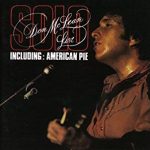
One of the things that I did was to perform solo. If I’d had a band that was hot I probably would’ve ratcheted everything up, but I didn’t want to do that. So I did ten years of performing solo, and I even put an album out called Solo on United Artists, and people liked that record a lot because that’s something that later on became important, you know [MTV] Unplugged and all that.
JM: What advice would you give to a songwriter who wants to improve their craft?
DM:: Listen to real music, and not the stuff that’s around now. I mean, listen to the stuff that’s around now if you want to know about the technical aspects, because they should certainly know how to play and how to record, and know how to put great bottom on records. They’ve got the rhythm thing down like crazy. But they don’t have the melody writing skills or the lyric writing skills. So I think that if somebody could really know his music and write songs with lyrics and melody, and record in the powerful way that people do now, then they would have something.
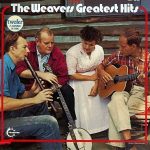
JM: Before you had big success, you were interacting with people like Fred Hellerman and Pete Seeger – you did the [Clearwater] riverboat trip with him. What did you learn from them?
DM:: What I learned from them was don’t worry about making mistakes, because they made mistakes all the time. I was pretty buttoned-up and pretty tight. I practiced a lot, and I wanted everything to be exactly right. But they were way beyond that. They had mastered the idiom, and they were filled with music, and understood the much bigger sphere of idiomatic mastery, rather than just practicing and getting a lick right, or getting a little arrangement right. It all was flowing.
And you start really in a small way, and you work and work and work, and you work onstage. It’s a very long process whereby you can conquer your fear of the stage, and move beyond worrying about whether you hit the right note, but actually move into a whole other place where you’re completely free, where you understand what you’re doing so well that if you make a mistake that it doesn’t even matter. But if you’re tight, and you’re programmed to just do this, if you make a mistake it throws you off, and you can lose your confidence onstage.
You never can lose your confidence in front of an audience. You must always know exactly what you’re doing every second. You know, it’s like when you see an Olympic skater fall, when that skater gets up and starts doing it again, you’re waiting for that person to fall again. You’re not letting yourself go, and trusting, and letting yourself enjoy the performance, because in the back of your mind you’re thinking, “This guy’s gonna trip.” That’s the effect that it has when the audience senses that you’ve lost your way, or that you’ve been flummoxed.
So there’s a whole lot of craft that a person has to know and learn in order to be a stage performer, a songwriter, and a recording artist. And they don’t come easy. You have to learn these over many years, and trial and error. I started out when I was 15 or 16, and by the time I was 18 I’d quit school and was in New York, and I was an opening act in a lot of little clubs in New York. I just wanted to play, and have a little audience, and I worked with some people who knew more than I did, and they would say to me, “No, this song goes better here. That song goes better there. Why don’t you tell a little story here? You’re not really reaching out to the audience.” They would critique what I was doing, and in doing that they opened my mind to all these different concepts.
A lot of performers never get to the point where they even think about whether they’re communicating with an audience, whether the audience likes them, understands them. And also, as an artist who works onstage all the time like I do, and have for many decades, it doesn’t take long for me to figure out what an audience is like, just like I can pick up a vibe from a person. I can do the same from a group of people, and I can know where I can go and where I can’t go, and what they want and what they don’t want. So it’s an artform – many artforms rolled into one.
Recording, songwriting, performing, singing, playing – these are all things that you can spend a lifetime doing. I was lucky to be able to do these things, and to be able to spend an enormous time on getting the singing right, or whatever, or figuring out how to write the right song, or whatever. Anybody can say, “Oh, I’m going to try to do this”. But you’re going to need a lifetime if you start and say, “I want to be a flamenco guitarist like Carlos Montoya.” Well, you’re going to need a few lifetimes, and you’re still not going to do it.
I’m amazed, myself, about all the things that have happened to me, that have been so great and so wonderful. You know, when I started out I left everything behind, because I could’ve gone to Wall Street, or had a job in banking or something because I studied finance and economics. But I love music, and I didn’t really want to work for anybody. So I started out right from the get-go with no benefits, no safety net, no money, no nothing. And each year that I got farther away from the kids that I’d gone to school with, they were advancing in the corporate world, and they were having children and settling down, and doing all the things you’re supposed to do, and I was this rambling boy. I was here, there, and everywhere, and I have not changed one bit. It’s been 50 years now, and I’ve loved it. I love seeing the places I go, the adventures, meeting the people, hearing their stories. I’m very lucky.

Discussion
No comments for “Interview: Don McLean”